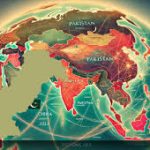Introduction
Artificial intelligence (AI) has become one of the most transformative forces of the 21st century. By 2025, AI is not just a buzzword; it is embedded into everyday life—from healthcare and education to finance, governance, and even security. Across the globe, nations are racing to adopt and regulate AI, recognizing its potential to revolutionize entire economies. The Middle East, particularly Kuwait, is positioning itself as a regional hub for AI innovation. With government-led initiatives, private sector investments, and international partnerships, Kuwait is laying the groundwork for a smarter and more resilient future.
Kuwait’s National Vision for AI
Kuwait has embraced artificial intelligence as part of its broader Vision 2035, which seeks to diversify the economy and reduce dependence on oil. AI plays a central role in sectors like healthcare, transportation, finance, and urban planning.
Government-led projects such as AI-powered smart cities and digital governance systems aim to improve citizen services while reducing bureaucratic inefficiencies. Kuwait also recognizes the ethical dimensions of AI and is working on policies to ensure its responsible and transparent use.
AI in Healthcare
One of the most impactful applications of AI in Kuwait is in healthcare. Hospitals and clinics are adopting AI-powered diagnostic systems capable of analyzing medical imaging with greater accuracy than human specialists. These systems not only reduce costs but also improve early detection of diseases such as cancer and heart conditions.
Telemedicine, boosted by AI-driven chatbots and digital assistants, is expanding healthcare access to rural areas. Kuwait’s Ministry of Health has partnered with global tech firms to train medical staff in using AI-based platforms, improving efficiency and reducing waiting times.
AI in Education
Education is another sector undergoing a major transformation. Kuwait’s schools and universities are integrating personalized AI learning platforms that adapt lessons to students’ abilities and progress. This approach ensures students receive customized education, addressing their individual strengths and weaknesses.
AI also plays a role in language translation tools, bridging cultural gaps and helping international students in Kuwait access resources in both Arabic and English. By 2025, several Kuwaiti universities have launched dedicated AI research centers, making the country a regional hub for academic innovation.
Smart Cities and Infrastructure
Kuwait is heavily investing in smart infrastructure projects that use AI to optimize energy use, manage traffic, and enhance public safety. AI-enabled traffic systems reduce congestion in Kuwait City, while AI-driven sensors monitor water and electricity consumption.
These initiatives not only improve quality of life but also support Kuwait’s commitment to sustainability and environmental responsibility. The concept of AI-driven smart governance is also emerging, where citizens can access government services through AI-powered platforms that minimize human error and corruption.
AI in Finance and Business
Kuwait’s financial sector is undergoing digital transformation with AI at its core. Banks and fintech startups are using AI for fraud detection, customer service, and automated trading systems. Chatbots powered by natural language processing handle customer inquiries around the clock, while predictive algorithms help investors manage risks and optimize portfolios.
The private sector is also leveraging AI for supply chain optimization, logistics, and e-commerce. This positions Kuwait as a competitive market in the broader Middle Eastern digital economy.
International Collaboration
Kuwait recognizes that AI cannot develop in isolation. It has entered into partnerships with leading AI hubs in the U.S., China, and Europe. These collaborations bring knowledge transfer, joint research opportunities, and access to cutting-edge technologies.
Kuwait also participates in regional AI conferences and collaborates with Gulf neighbors under the GCC framework to ensure shared progress in AI adoption and regulation.
Challenges Ahead
While Kuwait has made significant strides, challenges remain. A shortage of AI talent is one of the biggest obstacles, requiring greater investment in education and training. Additionally, concerns about data privacy, algorithmic bias, and job displacement persist.
To address these issues, Kuwait is working on comprehensive policies to ensure ethical AI development, while encouraging entrepreneurship and upskilling programs for the workforce.
FAQs
Q1: How is AI improving healthcare in Kuwait?
AI enables accurate diagnostics, supports telemedicine, and reduces waiting times in hospitals, enhancing healthcare delivery.
Q2: What role does AI play in Kuwait’s Vision 2035?
It supports diversification by transforming healthcare, education, governance, and finance, making Kuwait less reliant on oil revenues.
Q3: Are smart cities already operational in Kuwait?
Yes, AI-powered infrastructure projects are already underway, particularly in Kuwait City, focusing on traffic, utilities, and safety.
Q4: What challenges does Kuwait face in AI adoption?
Talent shortages, privacy concerns, and ethical issues remain challenges, but government initiatives are addressing them.
Q5: How does Kuwait collaborate internationally on AI?
Through partnerships with the U.S., China, and Europe, and regional collaboration via the GCC, Kuwait ensures global alignment.
Conclusion
Artificial intelligence in 2025 is no longer a distant dream; it is a reality shaping nations worldwide. For Kuwait, AI represents an opportunity to diversify its economy, enhance governance, and improve the quality of life for its citizens. By embedding AI in healthcare, education, finance, and infrastructure, Kuwait is building a smarter, more resilient future.
While challenges exist—particularly in talent development and ethical regulation—Kuwait’s proactive vision ensures it remains at the forefront of AI adoption in the Middle East. As global competition intensifies, Kuwait’s strategic investments and forward-looking policies will secure its place as a regional AI leader.








